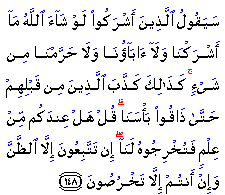Al-Anam (The Cattle)
Chapter 6: Verse 148
 Fallacy of Absolute Determinism Fallacy of Absolute Determinism
"Those who associate others with Allah in His divinity will now surely say: 'Had Allah willed, neither we nor our forefathers would have associated others with Allah in His divinity, nor would we have declared anything (which Allah did not forbid) as forbidden.' Even so those who had lived before them gave the lie (to the Truth) until they tasted Our chastisement. Tell them: 'Have you any sure knowledge that you can produce before us? In fact you are only following idle fancies, merely conjecturing.'"
The apology advanced by criminals and wrong-doers has always been an apology based on the assumption of absolute determinism. They would plead that the wrongs they have done was because those acts had been willed for them by God.
The complete refutation put forth by Allah is as follows:
Citing God's will to justify one's errors and misdeeds, and making it a pretext for refusing to accept true guidance was the practice of the evil-doers of all time. But they should remember that this had led to their ruin and they themselves were witnesses to the evil consequences of deviation from the Truth.
Their plea is based on fancy and conjecture rather than on sound knowledge. They refer to God's will without understanding the relationship between God's will and man's action. The fact is that whichever path a person chooses, be it that of gratitude or ingratitude to God, of guidance or error, obedience or disobedience, God will open that path for him, and thereafter God will permit and enable him with the framework of His universal scheme, and to the extent that He deems fit - to do whatever he chooses to do whether it is right or wrong.
Source:
"Towards Understanding The Quran " - Abul Ala Mawdudi |